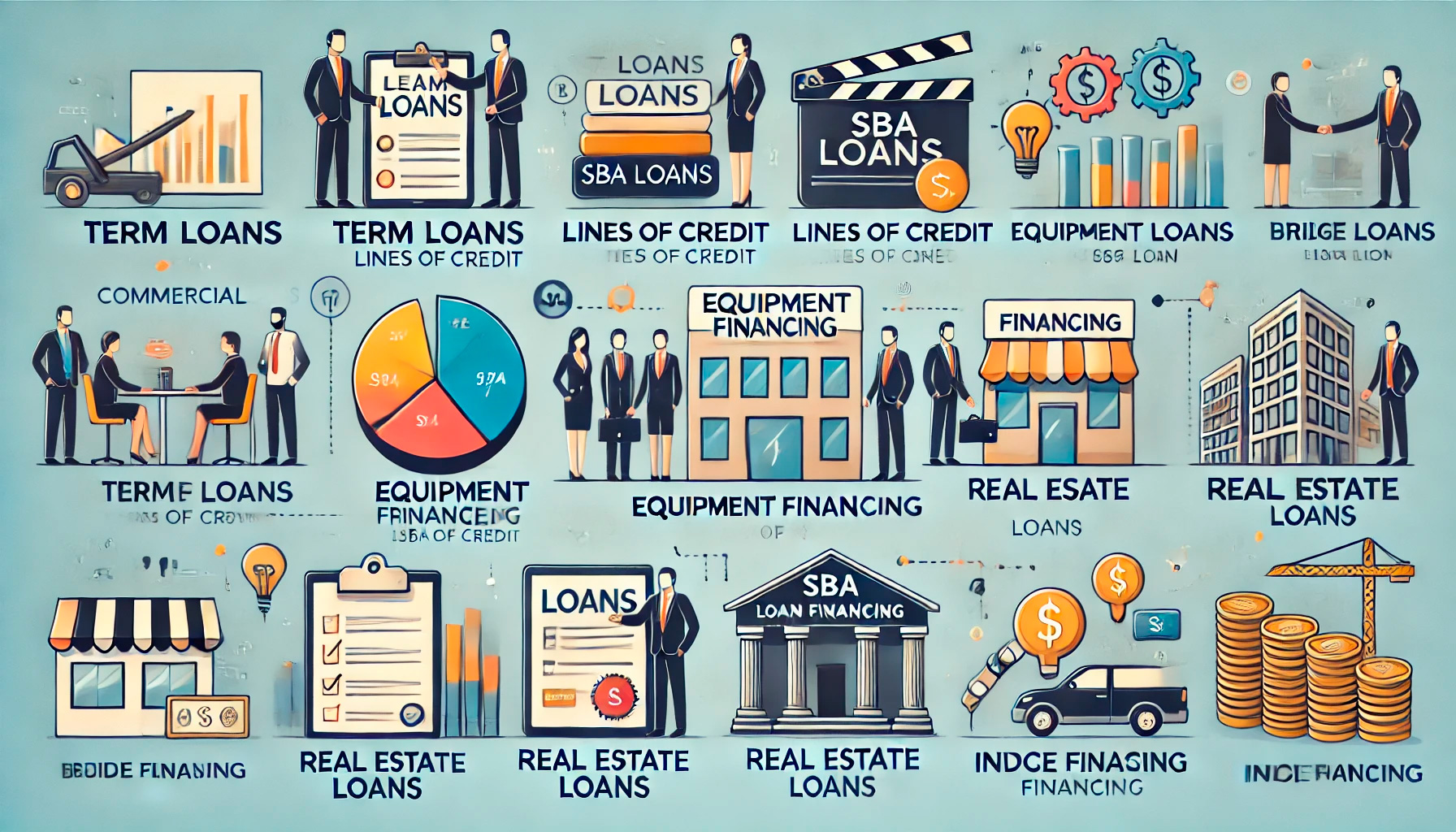
Exploring Different Types of Commercial Loans: Finding the Best Fit for Your Business Needs
Access to capital is critical for businesses looking to grow, expand, or navigate financial challenges. Commercial loans offer a diverse range of options tailored to meet the unique needs of businesses in various industries. Choosing the right type of loan is essential for achieving your goals while maintaining financial stability. This guide explores the different types of commercial loans available and how to determine the best fit for your business.
Understanding Commercial Loans
Commercial loans are designed to provide businesses with the financial resources necessary to fund operations, acquire assets, or expand. Unlike personal loans, these financing options cater to specific business needs and are typically offered in larger amounts with tailored repayment terms.
Lenders evaluate several factors when approving commercial loans, including the business’s revenue, creditworthiness, and purpose of the loan. Understanding the various loan types ensures you select the right option for your financial situation and objectives.
Term Loans: Long-Term Financing for Major Investments
Term loans are among the most common commercial loan options, providing businesses with a lump sum of money upfront that is repaid over a fixed period. These loans are ideal for funding significant investments, such as purchasing equipment, expanding facilities, or launching new product lines.
Term loans often come with fixed interest rates, providing predictable monthly payments that simplify budgeting. They are a suitable choice for businesses with clear goals and the ability to generate steady revenue to meet repayment obligations.
Lines of Credit: Flexibility for Ongoing Needs
A line of credit offers businesses access to funds on an as-needed basis, up to a predetermined limit. Unlike term loans, lines of credit allow you to borrow only what you need, when you need it, making them a flexible solution for managing cash flow or covering unexpected expenses.
Interest is charged only on the amount borrowed, and once the borrowed amount is repaid, it becomes available for use again. Lines of credit are particularly useful for businesses with seasonal revenue fluctuations or those that require quick access to funds.

SBA Loans: Supporting Small Business Growth
Small Business Administration (SBA) loans are government-backed financing options designed to support small businesses. These loans, such as the SBA 7(a) and 504 programs, offer favorable terms, including lower interest rates and longer repayment periods.
SBA loans are ideal for startups and small businesses with limited access to traditional financing. They can be used for a variety of purposes, from purchasing equipment and real estate to refinancing existing debt. While the application process can be more rigorous, the benefits make SBA loans a valuable resource for small businesses.
Equipment Financing: Acquiring Essential Tools
Equipment financing is a specialized loan used to purchase machinery, vehicles, or other tools critical to business operations. The purchased equipment serves as collateral, reducing the lender’s risk and often leading to favorable terms for borrowers.
This type of loan is ideal for businesses looking to upgrade their operations or invest in productivity-enhancing technology. Equipment financing ensures you can acquire the tools needed to stay competitive without depleting cash reserves.
Commercial Real Estate Loans: Investing in Property
Commercial real estate loans are tailored for businesses looking to purchase, develop, or refinance commercial properties. These loans are often used to acquire office spaces, retail locations, or warehouses.
Real estate loans typically involve substantial down payments and long repayment terms, making them suitable for established businesses with strong financial profiles. They provide the capital needed to secure property that supports business growth and enhances operational efficiency.
Bridge Loans: Short-Term Financing for Immediate Needs
Bridge loans provide businesses with temporary funding to cover immediate expenses or opportunities while awaiting long-term financing. These loans are commonly used for real estate transactions, such as purchasing a property before selling an existing one.
Although bridge loans often come with higher interest rates, their quick approval process and short repayment terms make them a valuable tool for businesses needing immediate capital.
Invoice Financing: Leveraging Outstanding Receivables
Invoice financing allows businesses to borrow against their outstanding invoices, providing immediate cash flow while waiting for customers to pay. This type of financing is particularly useful for businesses with extended payment cycles or those experiencing cash flow challenges.
By advancing a percentage of the invoice value, lenders ensure businesses can meet operational expenses without waiting for customer payments. Invoice financing is an excellent option for businesses in industries with lengthy billing cycles, such as construction or manufacturing.

Choosing the Right Commercial Loan for Your Business
Selecting the best commercial loan requires careful evaluation of your business’s needs, financial health, and goals. Consider the following factors when making your decision:
- Purpose of the Loan: Determine whether you need funds for a one-time investment, ongoing expenses, or a specific project.
- Repayment Capacity: Assess your cash flow and revenue projections to ensure you can meet repayment obligations.
- Loan Terms and Costs: Compare interest rates, fees, and repayment schedules across different loan options.
- Collateral Requirements: Decide whether you’re comfortable securing the loan with assets such as property or equipment.
Aligning the loan type with your business strategy ensures that you maximize the benefits of financing while minimizing risks.
Building Strong Relationships with Lenders
Establishing a positive relationship with your lender can enhance your borrowing experience and open doors to future financing opportunities. Regular communication, transparency, and a strong track record of loan repayment build trust and credibility.
Many lenders also provide additional resources, such as financial advice or business tools, to help you succeed. Leveraging these services strengthens your partnership and ensures you’re making the most of your financing options.
Conclusion: Empowering Your Business with the Right Loan
Commercial loans are a powerful resource for businesses at every stage of growth. From startups seeking initial funding to established companies planning major expansions, the diverse range of loan options ensures there’s a solution for every need.
By understanding the types of commercial loans available and aligning them with your business goals, you can secure the financing necessary to thrive in today’s competitive market. With careful planning, informed decision-making, and a clear vision, commercial loans can help you achieve your objectives and build a successful future for your business.
